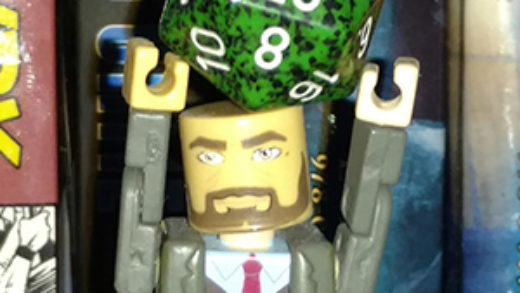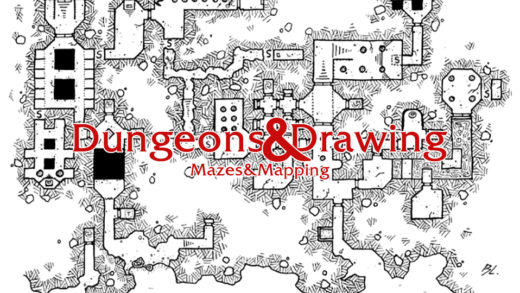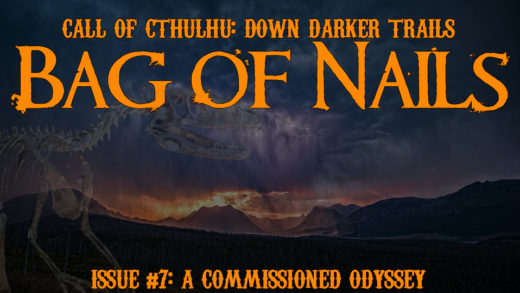Music arrangement has always been one of my passions. I’ve been making mix tapes and playlists since my pre-teens. Role-playing games have been another of my passions and I’ve been a regular player since my pre-teens as well. But those two passions did not meet in my life until my late 20’s. Even then, the Venn diagram overlap only recently became solidified in this age of digital media and distribution.
Most of my friends born during the 70’s and 80’s have had shared stories with me about their experiences with a tape recorder. Like me, they recorded songs from the radio, attempting to acquire their favorite songs with minimal DJ talk or overlap. They’ve made mix tapes for personal use, for sharing with friends, and for courting. A handful of my friends have even used their tape decks to record mock radio DJ shows, interspersing songs with their own announcements and anecdotes about the music. I still have a collection of tapes I made for my pseudo radio station.
A minor digression… I stepped away from fake radio DJing into a tape recorder in my early teens, but the opportunity to have a similar role again re-presented itself in the dawn of the age of MMOs. I had moved from Houston to Chicagoland and my friends (with whom I used to play PnP RPGs) had created an online radio station unofficially for The Sims Online called “Radio Bauhaus” and invited me to have a weekly show. I ran a weekly show with them for about a year before most of us stepped away from the game in favor of other MMOs, but the enjoyment I took in the experience of playing radio-style DJ prompted me to seek other opportunities. I started playing City of Heroes shortly after it launched and knew that one thing that would help keep me in the game would be to become a member of a community–one that played music. I applied and was accepted as a DJ for The Cape Radio. Even after the game shuttered, the station continued to run and I stayed with it. I no longer do a weekly show, but I help out where I can and try to do a show once a month.
In the late 90’s I collaborated with some of the members of my PnP RPG gaming group on post-game “soundtracks.” We made mix tapes for the events of previous sessions and campaigns, fitting songs to past actions. This was the first time, for me, that music and gaming came together. This was very early Internet and still during the height of the BBS era. While we familiar with MIDI and MOD files, the mp3 had yet to make it into our lives, so our mix tapes consisted of tracks from the CDs we owned or bought. As such, even with large libraries, our post-session soundtracks tended to repeat artists a lot, though we were diligent about not repeating songs. (It was members of this group that started The Sims Online “Radio Bauhaus” station.)
Houston in the 90’s was a good place to be a gamer. I worked with and crossed paths with a lot of gaming groups. One of my friends was preparing a Call of Cthulhu one-shot for a local gaming convention called NanCon and wanted to put together a background music mix tape for a haunted carnival. Online mp3 stores were just starting to make themselves available (or at least known to me) and even sources like Napster had yet to be developed. As such, finding a lot of carnival background music was not easy, but we did our best. I did not, at the time, attempt to run any of my games with background music, but the idea stuck with me.
Though I had already been radio DJing alongside MMO players for a few years, and had been a GM with groups through that time, I did not attempt to bring background music to my games until 2011. While I liked the idea, I had worried that my group would become distracted by the music, rather than letting it serve as an ambiance. We were a musically-inclined bunch of individuals already prone to breaking out in song if someone accidentally quoted lyrics or a gaming situation presented a potential tie to an earworm. Would playing non-lyrical songs in the background prove character breaking? The short answer? Sometimes.
I didn’t want to make more work for myself when I initially attempted background music play. And my computer was in a separate room from my gaming space. So, I turned to my CD collection of classical music, movie scores, and video game soundtracks. For the most part, this served me well. But, when a recognizable song or soundtrack refrain played, it could become distracting for the group. More than once, I caught a player (or myself) humming along. The idea was there, but it would require a bit more effort.
I started researching “soundtracks to imaginary films,” scores written for genres but weren’t present in the collective unconscious of the mainstream. This led me to discover Midnight Syndicate, who had capitalized on this idea in 1997–back when I was still living in Houston and my friends were trying to attempt to scrounge background tracks from our limited CD collections. If only I could take that information back to past me. I also found associated acts like Nox Arcana and Destini Beard. While some of the tracks of these artists had vocals (Destini, in particular, uses her voice as an instrument through all her tracks), I could create an arrangement of their music to make background soundtracks of my own that would hopefully not distract my players. The music of these artists was typically dark and gothic, perfect for the urban horror game I was running at the time. I purchased many of their albums and created a few mix CDs for background music.
My urban horror campaign ran for two years and I continued to find new orchestral “epic music” artists, like Thomas Bergersen and his production company Two Steps From Hell. During this time, I moved into a new apartment and my computer moved to my gaming space. I could now create large, multi-hour, playlists that could be put on random and played throughout the game.
One of the challenges I found with using background music was ensuring that lyrics or strong vocalizations were not present in the songs I played. My group noticed the music, but it didn’t become a game distraction unless there were vocals. The other challenge that faced me was not letting the music distract me as a GM. I did not want to pause the game to skip a track or play a specific track at a specific time. For me, the music was there to serve the game’s mood, not become the session’s focus. I did things like “tempo change” playlist swapping very sparingly. This meant more work in terms of arrangement and playlist building, but I could use the same playlist multiple times over without it affecting the game’s flow in play.
In 2013 the urban horror campaign ended it’s chapter and my group decided it was time to shift genres. We decided on playing a space game (but continued using the FATE engine). Originally, I thought about creating a universe from scratch, but in the end decided to use Galileo Games’s Bulldogs! space adventure setting. …More on that in a future article. The playlists I had arranged previously wouldn’t work for this genre, but I had a much better idea of what I needed to do and where I could research. I included tracks from other epic music artists like Future World Music, Audiomachine, and Clint Mansell (who has both televised and non-screen related soundtracks available). I tested the waters a bit by also including music from more independent video game soundtracks, like music from Shamus Young, who conceptualized, helped code, and scored the game “Good Robot.” Background music was no longer a distraction to the game, but a supplement to it.
As I write this post, my group is preparing to start our next campaign, changing genres from space to super-hero. Along with this, we’re also changing the way we play. Instead of fighting traffic, parking, and figuring out what we can order for dinner, to game at a specific location, we’ll all be playing from home, using an online service to manage the game as we play via webcam. This will mean a changes not only to the background music tracks themselves, but in the way background music is presented and played. I’m looking forward to adding new tracks to my library and chronicling my findings in the near future.
I’d also like to hear your thoughts and any experiences with background music in a tabletop setting. Please feel free to comment below!



Recent Comments